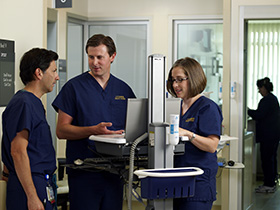Alumni distinction
An inaugural graduate champions health-care quality and safety at UC Davis Medical Center

Charley Johnston, one of the school's inaugural master's-degree graduates
In his new job, Charley Johnston—an inaugural graduate of the School of Nursing—has shifted his focus from providing high-quality care to individuals to improving the quality and safety of care for everyone in his hospital unit. As a quality and safety nurse champion in UC Davis Medical Center’s burn intensive care unit, he works to prevent hospital-acquired infections among a population that, due to burn injuries, is extremely vulnerable to infections.
Equipping health-care professionals with the knowledge and skills needed to effect system-level change—a step that improves direct, bedside care—is just what the Betty Irene Moore School of Nursing at UC Davis set out to accomplish. Johnston, one of the school’s 25 inaugural master’s-degree graduates, is one early example of this change in action.
“My graduate program at the School of Nursing strengthened my skills as a leader, a communicator and an educator,” Johnston said. “These enhanced abilities prepared me to act as an interdisciplinary change agent in my new role.”
Nearly one-half of the school’s first class has already progressed in their careers through promotions or new positions. In keeping with the school’s vision, all graduates are prepared to advance health and lead change across diverse health-care settings, from their workplaces to their communities.
There is great need for the change that leaders like Johnston are bringing to health-care delivery systems, with their well-known challenges of cost, quality and access.
As one of 11 quality and safety nurse champions at the medical center, Johnston works to improve the overall safety and quality of care by examining the interconnected processes that together comprise the delivery of health care. His work involves educating staff about best practices, policies and procedures, reinforcing these practices and working collaboratively to troubleshoot challenging patient care situations. The job takes leadership skills and the ability to work collaboratively with colleagues across health-care disciplines—capabilities that Johnston cultivated through the master’s program.
Johnston’s day begins at 5:30 a.m. so that he is up to speed prior to the 7 a.m. nursing shift change. He reviews any quality or safety issues that arose overnight, and engages his colleagues in conversation about topics of concern. Johnston then participates in morning rounds with his clinician colleagues, maintaining his focus on quality and safety issues and suggesting alternative approaches when needed.
“You have to devote time to building trust, communicating, and getting buy-in from your colleagues,” he said. “I have really worked to be viewed as a resource, not a disciplinarian, by nurses, physicians, respiratory therapists, and the wide variety of people who work within the health system.”
The educational environment at the School of Nursing prompted Johnston to seriously consider the next step in his career and helped inspire him to pursue the quality and safety role. He also received a Senior Citizens of Davis Award in 2011-12, which helped support his graduate education. Johnston notes that the school undoubtedly strengthened his skills as a leader and made him confident to take on a role as a change agent.
“The time was right to change my focus and look at the bigger picture of how health care is delivered,” Johnston said.





